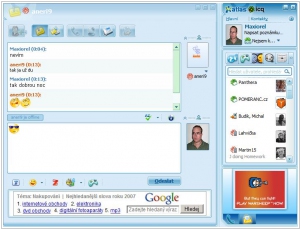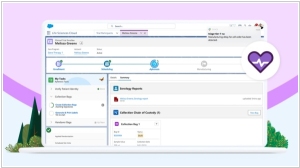ICQ is #18 in Top 10 Business Messaging platforms
ICQ is an instant messaging computer program. ICQ features include sending text messages, offline support, multi-user chats, free daily-limited SMS sending, resumable file transfers, greeting cards, multiplayer games and a searchable user directory.
Positions in ratings
#18 in Top 10 Business Messaging platforms
Alternatives
The best alternatives to ICQ are: WhatsApp, Telegram
Latest news about ICQ
2008. Soashable clones Meebo, adds open source
Meebo must be feeling quite flattered right now, as an open-source clone called Soashable has emerged, offering similar features to what Meebo provided just a year ago. While it may lack some of the advanced functionalities, such as platform support, group chat rooms, and seamless integration with Google Talk and ICQ, Soashable shows promise, especially considering the success of open-source IM platforms like Pidgin. Aside from the hosted web application that supports three major IM clients, Soashable can be integrated into personal websites by installing it on one's server. Although the chat windows currently display debugging information, I was able to engage in seamless conversations on AIM and Yahoo. Looking ahead, this project holds potential as a plugin for personal blogs or sites, allowing users to create customized versions of the service with various skinning and personalization options. Meebo has already explored similar avenues through sponsorships and advertising campaigns that leverage skinning functionalities, but empowering users to tailor every aspect of the design to their preferences is what made Trillian popular with its SkinXML engine.
2004. ICQ to ping application developers
ICQ, a subsidiary of America Online (AOL), is set to launch a major software overhaul next week, introducing ICQ 4.0 with new features and applications. The latest version of its instant messaging client will be accompanied by the announcement of an initiative allowing partners to access ICQ application programming interfaces (APIs), according to sources. While the APIs will initially be available to select partners, ICQ plans to eventually release them to the public. Games publisher Oberon Media and dating service Lava Life have participated in a trial run, developing applications for ICQ 4.0. The new version aims to turn ICQ into an application platform, leveraging the APIs to offer various programs within the instant messenger client. The APIs will support programming in HTML, DHTML, and Flash, enabling developers to create a range of innovative applications. ICQ's move is seen as an attempt to revitalize its popularity and compete with rivals such as AOL's AIM.
2002. ICQ gets back to basics
America Online (AOL) has released a simplified version of its popular instant messaging service called "ICQ Lite," which targets first-time users with its user-friendly interface. ICQ Lite is smaller in size, taking up 1.7MB compared to the standard 3.6MB, and offers fewer features than the full-featured ICQ. The focus of ICQ Lite is on essential instant messaging functions such as real-time text exchange, user search, SMS messaging to cell phones, file transfers, and multilingual support. While AOL owns both ICQ and AOL Instant Messenger (AIM), the two services have not been allowed to communicate with each other, citing different user preferences. AOL's dominance in the instant messaging space has drawn regulatory scrutiny, but its competitors have found success despite the lack of interoperability.
2001. AOL adds file sharing to ICQ
America Online (AOL) has unveiled an updated version of its ICQ instant messenger, marking the first major update in a year. ICQ 2001b Beta v5.15 introduces new features such as file sharing, two-way messaging with cell phones, multilingual support, a spell checker, and enhanced graphical emoticons. Users can now save their contact list on their computer and request contact lists from friends. The release comes as competitors like Microsoft and Yahoo are adding new features to their own messaging services to attract users. Despite these advancements, the lack of interoperability among different instant messaging platforms remains a challenge, with AOL yet to enable communication between its two services. Critics have urged AOL to open up its IM networks, leading to interoperability trials with companies like Sun Microsystems and IBM's Lotus Sametime. According to research firm Jupiter Media Metrix, AOL's ICQ and AOL Instant Messenger continue to have a significant user base compared to competitors like Microsoft's MSN Messenger and Yahoo Messenger.
2001. Is the ICQ experiment working?
AOL Time Warner's ICQ instant messenger service recently reached a milestone of 100 million members, but the company has yet to achieve its goal of turning ICQ into a profitable business. ICQ has gained popularity and rapid growth through viral marketing and word of mouth, becoming one of the most popular instant messaging (IM) services worldwide, alongside AOL Instant Messenger (AIM). However, it's worth noting that AOL counts registered users each time someone downloads the ICQ software, making it unclear how many of the 100 million are active users. Despite ICQ's potential, AOL has struggled to monetize its IM platforms, leading some analysts to view it more as a feature than a significant revenue generator. AOL acquired ICQ in 1998, aiming to leverage its large user base, younger demographics, and international reach to compete with web portals like Yahoo and Excite.com. Over the years, AOL has added portal-like features to ICQ, but transforming it into a fully-fledged business has proved challenging. The company's attempts to integrate advertisements and explore e-commerce opportunities have met with mixed success. Nevertheless, ICQ's position as a popular communication tool remains a core appeal for users, and AOL continues to explore ways to tap into its potential.
1999. AOL launches beta for voice-enabled messenger
America Online (AOL) is making plans to enhance its AOL Instant Messenger (AIM) service with voice capabilities, known as AIM Talk. AIM Talk enables users to communicate through their PCs using voice input via a computer microphone. AOL is currently testing the voice-enabled service and intends to release it officially by the end of the year. AIM has gained widespread popularity, attracting both AOL members and non-members who can communicate with AIM users in real time. However, the service has faced criticism, particularly after Microsoft launched its own instant messaging service, MSN Messenger, which included interoperability with AIM. AOL accused Microsoft of unauthorized access to its system and subsequently blocked their access to the AIM network.
1999. ICQ gets vocal with telephony
ICQ, a subsidiary of America Online (AOL), announced a partnership with internet telephony company Net2Phone to enable ICQ users to make phone calls over the internet. The companies have signed a four-year agreement to develop internet telephony services for ICQ. The integration of Net2Phone's technology into ICQ software will begin in the spring. Users will have the capability to make calls from computer to computer, computer to regular phone, or regular phone to computer. The aim is to provide a seamless and convenient voice communication experience within ICQ. While computer-to-computer calls will be free, computer-to-phone calls will incur charges based on Net2Phone's existing pricing structure. This partnership is a significant opportunity for Net2Phone, as it grants access to ICQ's user base of 38 million. The demand for internet telephony is expected to surge in the coming years as technology improves and additional features like video conferencing and unified messaging are introduced. This collaboration serves as a major distribution channel for Net2Phone's technology.
1999. AOL sharpens ICQ ambitions
One year after America Online's acquisition of ICQ for $287 million, the popular instant messaging software has seen a significant increase in popularity but remains unprofitable. ICQ, created by four Israeli entrepreneurs, gained a cult-like following without any marketing expenses, much like Hotmail. AOL now aims to monetize ICQ's growing user base, but faces the challenge of introducing advertising and direct marketing without alienating its young and international audience. While AOL's president, Ted Leonsis, is optimistic about the conversion process, others express skepticism regarding the company's revenue plans. ICQ's appeal lies in its stickiness, with millions of users concurrently logged in, but turning it into a substantial revenue generator remains a work in progress. AOL has integrated new features and services into ICQ, transforming it into a desktop communications portal, but revenue generation has yet to materialize. AOL's long-term plan involves opt-in direct marketing, allowing users to establish personalized communication channels with e-commerce vendors and services. Privacy advocates and analysts believe opt-in marketing could be successful if users have the choice to receive offers. However, the success of these revenue models ultimately depends on user preferences and purchasing behavior.
1999. MSN's Messenger late to the party
Microsoft's release of its instant messaging software, MSN Messenger, has faced numerous delays, putting it at a significant disadvantage compared to America Online's dominant instant messaging clients. The delay was attributed to integration issues with MSN Hotmail, Microsoft's web-based email service. Analysts suggest that management confusion within Microsoft and organizational turmoil in its MSN division have hindered the release. Meanwhile, AOL's ICQ and AOL Instant Messenger continue to gain popularity, leaving Microsoft with a challenging task of catching up. Microsoft plans to bundle MSN Messenger with MSN Hotmail in a larger communications package, but the exact revenue strategy and timeline for release remain uncertain. Critics argue that Microsoft's delays have cost it in the rapidly growing instant messaging market, while others believe Microsoft can still succeed if it focuses on the technology's scalability and user experience.
1998. What will AOL do with ICQ?
After confirming the acquisition of Mirabilis, the company behind ICQ, America Online (AOL) faces questions regarding how it plans to monetize this popular internet messaging service. With the purchase of Mirabilis for $287 million, AOL gains access to ICQ's large user base and its widely downloaded ICQ software. Analysts speculate on various strategies AOL could employ, including leveraging ICQ's technology and customer base to facilitate product distribution and advertising, expanding its reach into international markets, attracting a younger and more internet-savvy audience, and potentially transforming ICQ into a standalone web service or portal. However, specific plans and announcements from AOL regarding the integration and future of ICQ remain scarce. The acquisition may result in some users dropping their memberships, as seen with AOL's previous acquisition of CompuServe. Despite potential fallout, many experts consider the acquisition a powerful move for AOL.


